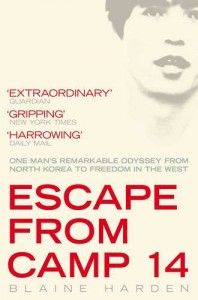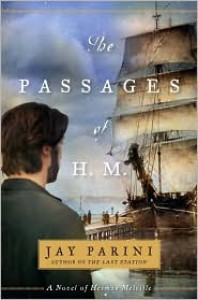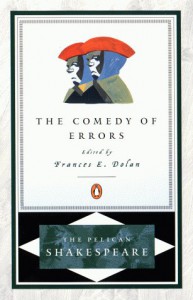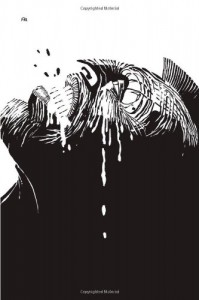 I'm sure if Marx could have his way, he would prefer not to be remembered for The Communist Manifesto. His language is forceful and impassioned, which is not unexpected given his age at the time of its writing, but like many forceful, passionate works, it is also demagogic and sophistical.
I'm sure if Marx could have his way, he would prefer not to be remembered for The Communist Manifesto. His language is forceful and impassioned, which is not unexpected given his age at the time of its writing, but like many forceful, passionate works, it is also demagogic and sophistical.Like all halfway decent thinkers, Marx was able to advance beyond his earlier work and refine his ideas. But unfortunately for him, this was his most lasting literary gift to the world. I never could have imagined such a minuscule pamphlet could contain so much bloviation. While the first two sections had some interesting, albeit superficially treated, points, the final two sections were very much suited for their times and not for posterity, as they dealt with the differences between the various socialist parties and literature of the day. In other words, minutiae of interest only to the scholar or sycophant. On the whole it was at times tortuous, and at others facilely polemical.
Though I haven't read Capital yet, I plan on it. I thoroughly disagree with Marx's prescriptions for a just society, but I respect that he was a man whose ideas became wildly influential, and it would be unfair of me to judge his entire career by this notorious little trifle he turned out in his youth. But if I am to judge The Communist Manifesto strictly on its merits alone, I think my rating is more than fair.
Mises and Austrian Economics: A Personal View
 "The flowering of human society depends on two factors: intellectual power of outstanding men to conceive sound social and economic theories, and the ability of these or other men to make these ideologies palatable to the majority." - L. v. Mises, Human Action
"The flowering of human society depends on two factors: intellectual power of outstanding men to conceive sound social and economic theories, and the ability of these or other men to make these ideologies palatable to the majority." - L. v. Mises, Human ActionThis is former Texas Congressman Ron Paul's (very brief) panegyric to the thought of Austrian economist Ludwig von Mises. It is a fairly breezy read, and due to its length Paul only superficially treats Mises' ideas, and where he believes they lead. That's not a knock against Congressman Paul or the book, of course, as its intent was not to be an exhaustive study of Misesian economics.
Though he didn't elaborate very much on the point, Paul's philosophical side shined through in the final chapter (aptly titled "Natural Rights") where he aired his only beef with von Mises: the issue of natural rights vs. utilitarianism. Ron Paul is a firm believer in a "God given" right to liberty that all men are endowed with, whereas Mises rejected this as antiquated metaphysical nonsense. Von Mises did not require this natural right to liberty in order to justify his economics; he felt that its utility was evidence enough of its superiority to all others. Ron Paul sketches out why he thinks that utility, while it does favor laissez-faire over controlled economies, is not a strong enough justification for a free market economy. Only natural rights--the right to liberty inherent in us all--can do that. His argument is brief, but if only for that glimmer of Ron Paul the philosopher, this slim volume is worth the read.
 A very relevant and prescient manifesto; and this despite its final chapter--which took up nearly a quarter of the entire book--being devoted to "the Soviet menace." Suffice to say that old Barry, unhappy with the performances of his Republican contemporaries, would be downright disgusted and ashamed with their successors in 2013. If this book were published today, it'd more aptly be titled, "The Conscience of a Libertarian."
A very relevant and prescient manifesto; and this despite its final chapter--which took up nearly a quarter of the entire book--being devoted to "the Soviet menace." Suffice to say that old Barry, unhappy with the performances of his Republican contemporaries, would be downright disgusted and ashamed with their successors in 2013. If this book were published today, it'd more aptly be titled, "The Conscience of a Libertarian."
 I agree with the reviews here that criticize this book as lacking psychological insight into the protagonist, Shin. I don't see this as the author's fault, however. Rather, this inscrutability is the result of over two decades of life in a North Korean gulag, from birth until young adulthood. Shin is not so much guarded as he is emotionally stunted. We expect familiar thoughts and emotions from him that we shouldn't, as he was manipulated from birth to lack them. This is the fault of his cruel, evil North Korean captors, not Harden's.
I agree with the reviews here that criticize this book as lacking psychological insight into the protagonist, Shin. I don't see this as the author's fault, however. Rather, this inscrutability is the result of over two decades of life in a North Korean gulag, from birth until young adulthood. Shin is not so much guarded as he is emotionally stunted. We expect familiar thoughts and emotions from him that we shouldn't, as he was manipulated from birth to lack them. This is the fault of his cruel, evil North Korean captors, not Harden's.
 Despite being unabashedly polemical, Fontova is fastidious in providing credible sources along with his assertions. This is not a balanced inspection of Che Guevara's life, so if that's what you're looking for, move right along. Fontova writing about Che is the equivalent of Richard Dawkins writing a history of the creationist movement. But just as Dawkins is a scientist and doesn't need to resort to lies to prove his point, neither does Fontova need to lie to paint an ugly portrait of Che. Fontova can back up what he writes. I'm no fan of Che, and I was aware before coming to this book that he was thoroughly covered in warts, like many leaders are, but some of the things I read were shocking. With that said, they were corroborated by official documents, eyewitness accounts, and in some cases, Che's diaries themselves!
Despite being unabashedly polemical, Fontova is fastidious in providing credible sources along with his assertions. This is not a balanced inspection of Che Guevara's life, so if that's what you're looking for, move right along. Fontova writing about Che is the equivalent of Richard Dawkins writing a history of the creationist movement. But just as Dawkins is a scientist and doesn't need to resort to lies to prove his point, neither does Fontova need to lie to paint an ugly portrait of Che. Fontova can back up what he writes. I'm no fan of Che, and I was aware before coming to this book that he was thoroughly covered in warts, like many leaders are, but some of the things I read were shocking. With that said, they were corroborated by official documents, eyewitness accounts, and in some cases, Che's diaries themselves!If you're looking for an examination of the less-than-heroic aspects of the man and the myth, look no further. Despite the macabre subject matter, you may even find yourself chuckling at Fontova's Che: a bumbling, groveling coward who couldn't fight his way out of a paper bag, let alone lead a global revolution; an appendical addition to the revolution in Cuba who relied more on his photogenicity than intellect, ferocity, or political skill.
 An enjoyable, mostly sympathetic (fictional) narrative of Melville's life. This is no biography, nor does it attempt to be, but rather an attempt to blow life into a character most of us know only as a name on a book's cover (if even that). To Parini's credit, he brought us a Herman Melville who was not flat as paper he wrote on, but three-dimensional, with hopes, dreams, pain, happiness, and everything in between. While this wasn't exactly the Melville I've conjured in my own mind from reading a good deal of his writings, it was not totally unlike how I imagined him, either. None of us, given only an author's books to go by, would ever come away with the same impression of him/her, so that Parini's take on Melville differs from mine is unsurprising.
An enjoyable, mostly sympathetic (fictional) narrative of Melville's life. This is no biography, nor does it attempt to be, but rather an attempt to blow life into a character most of us know only as a name on a book's cover (if even that). To Parini's credit, he brought us a Herman Melville who was not flat as paper he wrote on, but three-dimensional, with hopes, dreams, pain, happiness, and everything in between. While this wasn't exactly the Melville I've conjured in my own mind from reading a good deal of his writings, it was not totally unlike how I imagined him, either. None of us, given only an author's books to go by, would ever come away with the same impression of him/her, so that Parini's take on Melville differs from mine is unsurprising.Also being a fan of Tolstoy's, I'll be sure to check out [b:The Last Station: A Novel of Tolstoy's Last Year|2081356|The Last Station A Novel of Tolstoy's Last Year|Jay Parini|https://d202m5krfqbpi5.cloudfront.net/books/1349053292s/2081356.jpg|1685227] one of these days, too.
The New Atlantis
 I know what you're thinking--"Who is this Philistine that gives a work as important as The New Atlantis only two stars?" But I swear, it's a justifiably low rating! And here's why:
I know what you're thinking--"Who is this Philistine that gives a work as important as The New Atlantis only two stars?" But I swear, it's a justifiably low rating! And here's why:Firstly, unfulfilled expectations. In The New Atlantis, Bacon chose to weave his ideas into a piece of fiction, instead of expounding them in your typical, scholarly philosophy tract. The problem is, he really didn't craft a story that is any more compelling than a straightforward piece of philosophy. "Dry" doesn't do it justice; "xeric" is perhaps more fitting.
The ideas contained within it are strong. Indeed, his ideas about scientific research and how it should be conducted in centers of learning, embodied by "Salomon's House," was revolutionary, and certainly changed the course of academia for the better. I repeat, the strength of the ideas are not what I'm disappointed with here, but rather it's their packaging that is. As a piece of fiction, it is a failure. If Bacon had instead just decided to write his ideas in a more direct form, like Discourse on the Method, I'd probably have given it a much higher rating. But since he decided this was to be a fantasy, a fiction, I have no choice but to judge it on its merits as such.
Secondly, and more briefly, is that The New Atlantis is unfinished. Perhaps if it had been finished, Bacon would have edited it substantially and improved its narrative weaknesses. Or perhaps not. We'll never know. But as it stands, it's certainly not the best piece of philosophy I've ever read, nor the best piece of fiction.
The last time I checked, the GR star ratings don't revolve around how influential something is, but on how much we the readers enjoyed the book--"did not like it," "it was OK," "liked it," etc. With that in mind, two stars sounds fair to me.
 Cute.
Cute.I don't often use this word to describe something I've read, but I think it's acceptable to use The Comedy of Errors. It's not the strongest play of Shakespeare's that I've read, but that's understandable as it is apparently one of his earliest. And of course, occupying the middle ground in Billy Shakes' oeuvre is nothing to sneeze at; to reach such a level of "mediocrity," at least relative to the rest of his works, is an accomplishment many would give a pound of flesh to say they have achieved.
Shakespeare inserts comedy into all of his plays, even those most tragic ones, though this is the first actual comedy of his I've read. I can't say I was rolling on the floor in stitches throughout the whole thing, but I certainly guffawed very audibly when Dromio (of Syracuse) was describing his obese "wife's" appearance, likening her to a globe, and continuing to point out which body part corresponded to which country.
The Gospel According to the Son
 When I started reading this book-- after maybe the first few chapters--I thought it would end up being a dud. The writing didn't impress me, and the premise seemed goofy. Norman Mailer writing a first-person narrative of Jesus' life? I mean, I know Norman Mailer thought of highly of himself as God, or at least a god, but still it seemed like it would spell disaster before I reached the end. But now that I've finally finished, what I assumed would be a two-star (three-star at best) affair has turned out to be pretty good.
When I started reading this book-- after maybe the first few chapters--I thought it would end up being a dud. The writing didn't impress me, and the premise seemed goofy. Norman Mailer writing a first-person narrative of Jesus' life? I mean, I know Norman Mailer thought of highly of himself as God, or at least a god, but still it seemed like it would spell disaster before I reached the end. But now that I've finally finished, what I assumed would be a two-star (three-star at best) affair has turned out to be pretty good.I can't address the historical accuracy of this book, nor would I want to. I don't think that's the type of thing Mailer was looking to achieve anyway. Does it jive with the latest in Christology? Does it deviate from the Gospels? I don't know, nor do I care. Did I find his writing captivating? Yes, I did. Did he bring the character of Jesus alive to me, a practical atheist? Yes, he did. Was I sympathetic to him, did I care to see what would happen to him next, despite already knowing the story of his life? Yes, I was and I did.
A criticism I'd make about the characterization, however, would be that Mailer only scratched the surface of the Jesus character. What he gave us was good, but it could have been a lot better if he had chosen to go deeper.
I'm still not sure why Mailer wrote this book, but I'm glad he did. It gave me enjoyment, and while it wasn't a religious experience, it was very satisfying. Maybe if Mailer had written the Bible I'd be a believer.
(I'll have to finally get around to reading The Last Temptation of Christ to see how it compares. What I've read from Kazantzakis I've really liked, so I expect no less from The Last Temptation.)
 Are you there, Chuck Palahniuk? It's me, Steve.
Are you there, Chuck Palahniuk? It's me, Steve.I just finished reading Damned, and I've got to tell you, it was terrible. This is the third novel of yours that I've gone through, and I'm starting to get the feeling that whatever spark of brilliance I saw in Fight Club was not presaging a coming coruscation, but was rather just a cold phosphorescent illusion.
Yes, I may only be an American male in his mid-to-late twenties, but I do know what the words "presaging" and "coruscation" mean. I will admit that you taught me one new word, though, and that was weltschmerz. So thanks for that.
I should stop reading Chuck Palahniuk novels and cut my losses at this point, but sometimes it's kind of enjoyable, in a masochistic way, to read something this bad.
 Brutal. If this wasn't one of Shakespeare's plays, written in Elizabethan English, you'd swear it was a script for an Eli Roth splatter film.
Brutal. If this wasn't one of Shakespeare's plays, written in Elizabethan English, you'd swear it was a script for an Eli Roth splatter film.
 I was very underwhelmed by this installment of the Sin City series. Reading over other peoples' reviews here on Goodreads, I'm heartened to see I'm not the only one.
I was very underwhelmed by this installment of the Sin City series. Reading over other peoples' reviews here on Goodreads, I'm heartened to see I'm not the only one.There were couple of things that made this one so much weaker than its four predecessors.
(1) Simplistic storyline. True, the other volumes mostly contained various concatenations of vintage pulp tropes, but through the artwork, characterization, and language, the stories took on emergent properties.
(2) Characters. Very flat. Miho is a killing machine who never speaks. We get it. Yawn. As for the other lead, I can only assume it's Dwight. He was pretty drab in this one. The Mafia goons were just lazy sketches--figuratively and literally. That brings me to my next point.
(3) The artwork. It seemed rushed, as if Miller put very little effort into it. This accusation doesn't seem far-fetched, given the diminutive size of this volume compared to the others.
All in all, a disappointment to an otherwise big fan of the series.
 Well, that was odd.
Well, that was odd.On the plus side, at least the overt racists in this books were vilified. On the negative side, the author drew heavily on ridiculous, lazy racial stereotypes that were just slightly less appalling than the views of his aforementioned villains.
Still, I could forgive the unintentional racism if the story were good. But unfortunately, it was quite stupid. Things went downhill almost exactly in the middle of the book, when the author apparently decided that what this story of rugged survivalism lacked were futuristic black men who liked to castrate their servants.
 The writing itself was incredible, a real improvement from his first two novels, but the theme was underdeveloped. I'm no music theorist, but I'd say "Women" was more of a simple repeating canon, like "Row, Row, Row Your Boat," than a complex fugue like one of Bach's pieces from Die Kunst der Fuge. Thankfully the style saved it and made this one highly readable, despite its sometimes tiresome subject matter.
The writing itself was incredible, a real improvement from his first two novels, but the theme was underdeveloped. I'm no music theorist, but I'd say "Women" was more of a simple repeating canon, like "Row, Row, Row Your Boat," than a complex fugue like one of Bach's pieces from Die Kunst der Fuge. Thankfully the style saved it and made this one highly readable, despite its sometimes tiresome subject matter.
 I remember seeing the "Sin City" movie back when it came out a few years back, and although I enjoyed it, I never really got around to reading the source material. I'm glad I finally changed that.
I remember seeing the "Sin City" movie back when it came out a few years back, and although I enjoyed it, I never really got around to reading the source material. I'm glad I finally changed that.This is the first little collection of "yarns." The artwork is iconic and incredible. The storyline is darker than a city alleyway, just as a good noir should be. The only weakness is the writing, which seems like an afterthought. It's not that its overly pulpy--it's supposed to be, so I don't fault it for that--it just seems...shoddy, as if Frank Miller knew people wouldn't care too much how well he wrote since the images were so entrancing.
Still a very captivating experience. I've already put the next three collections on hold at the library.
 Learned a lot about people in the MMA world who aren't named BJ Penn, and I can't say the portraits of them were too flattering. Now, this is only one side of the story, but regardless of how you feel about BJ, he does come across as honest. It was one of the better books by a fighter I've read yet, even though (or perhaps due to the fact that) it was coauthored.
Learned a lot about people in the MMA world who aren't named BJ Penn, and I can't say the portraits of them were too flattering. Now, this is only one side of the story, but regardless of how you feel about BJ, he does come across as honest. It was one of the better books by a fighter I've read yet, even though (or perhaps due to the fact that) it was coauthored.Postscript: I heard today, 2/13/13, that BJ mentioned the dropping down to 155 and fighting as a lightweight once again. Only time will tell if this pans out, but I'll certainly be supporting the Hilo Kid whenever and wherever he fights!




